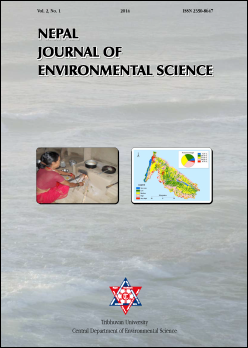Fuzzy logic in air pollution: Revisited
DOI:
https://doi.org/10.3126/njes.v2i0.22735Keywords:
Air pollution, alpha cut, fuzzy logic, fuzzy c mean clustering, fuzzy modelingAbstract
In everyday life and field, people mostly deal with concepts that involve factors that defy classification into crisp sets. The decisions people usually make are perceptions without rigorous analysis of numeric data. Like in other field of studies, there may exist imprecision in air quality parametric data collected and in the perception made by air quality experts in defining these parameters in linguistic terms such as: very good, good, poor. This is the reason why over the past few decades, soft computing tools such as fuzzy logic based methods, neural networks, and genetic algorithms have had significant and growing impacts to deal with aleatory as well as epistemic uncertainty in air quality related issues. This paper has highlighted mathematical preliminaries of air pollution studies like Similarity Measures (Cosine Amplitude Method), Fuzzy to Crisp Conversion (Alpha cut method), Fuzzy c Mean Clustering, Zadeh-Deshpande (ZD) Approach and linguistic description of air quality. Similarly, the applications of fuzzy similarity measures and fuzzy c mean clustering with defined possibility (- cut) levels in case air pollution studies for Delhi, India have been reflected. Though the approach of using fuzzy logic in pollution studies are not of common practice, the comprehensive approach that involves air pollution exposure surveys, toxicological data, and epidemiological studies coupled with fuzzy modeling will go a long way toward resolving some of the divisiveness and controversy in the current regulatory paradigm.
Downloads
Downloads
Published
How to Cite
Issue
Section
License
This license enables reusers to distribute, remix, adapt, and build upon the material in any medium or format for noncommercial purposes only, and only so long as attribution is given to the creator.

